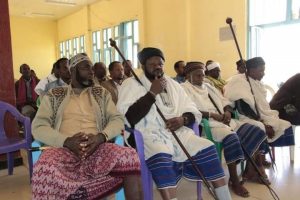The Haramaya Law Review (HLR) publishes original scholarly works on any topic relevant to the legal community, including analysis of domestic or international laws and cases, the African Union and other international organizations, challenges and lessons from domestic practice, and original field research.
Current Issue
Vol. 5 No. 1 (2016): HLR
Published: 2024-03-08
Articles
Peer Review:
The Haramaya Law Review (HLR) maintains a high standard of publication quality through a double-blind peer review process, in which identities of author(s) are not disclosed to reviewers and identities of reviewers are also not disclosed to author(s). All research articles published in HLR are subjected to a full double-blind peer review process by editorial team (internal) and at least two reviewers (external) as indicated below:
• All manuscripts shall be reviewed internally by the Editorial Committee for its originality, technical efficiency and subject matter relevancy.
• All feature articles that satisfy the internal review process shall be reviewed by at least two external reviewers.
• External reviewers are experts on the subject matter under discussion with proven experience on the area by their scholarly contribution, publication or practice.
• HLR aims at a general legal audience who may or may not possess extensive legal education. It is, therefore, helpful to introduce or explain complex legal ideas, organizations, acronyms, authors, or publications discussed in the article, so as not to confuse readers.
• Decisions are made by the journal’s Editorial Committee on the basis of reviewers' and editors’ comments.
• Advisory Board of the journal lend insights, advice and guidance to the other Editorial Committee members of the journal.
Open Access Policy:
Publication Scheduling:
General:
Focus and Scope
The Haramaya Law Review (HLR) publishes original scientific manuscripts and disseminates scientific and information to the users in Ethiopia, Africa and elsewhere in the world. It also enhances exchange of ideas among scientists engaged in research and development activities and accepts papers from anywhere else in the world. The Haramaya Law Review (HLR) publishes original scholarly works on any topic relevant to the legal community, including analysis of domestic or international laws and cases, the African Union and other international organizations, challenges and lessons from domestic practice, and original field research.
Peer Review Process
The Haramaya Law Review (HLR) maintains a high standard of publication quality through a double-blind peer review process, in which identities of author(s) are not disclosed to reviewers and identities of reviewers are also not disclosed to author(s). All research articles published in HLR are subjected to a full double-blind peer review process by editorial team (internal) and at least two reviewers (external) as indicated below:
• All manuscripts shall be reviewed internally by the Editorial Committee for its originality, technical efficiency and subject matter relevancy.
• All feature articles that satisfy the internal review process shall be reviewed by at least two external reviewers.
• External reviewers are experts on the subject matter under discussion with proven experience on the area by their scholarly contribution, publication or practice.
• HLR aims at a general legal audience who may or may not possess extensive legal education. It is, therefore, helpful to introduce or explain complex legal ideas, organizations, acronyms, authors, or publications discussed in the article, so as not to confuse readers.
• Decisions are made by the journal’s Editorial Committee on the basis of reviewers' and editors’ comments.
• Advisory Board of the journal lend insights, advice and guidance to the other Editorial Committee members of the journal.
Publication Frequency
The Haramaya Law Review will be published at least once a year.
Open Access Policy
This journal provides immediate open access to its content on the principle that making research freely available to the public supports a greater global exchange of knowledge.




